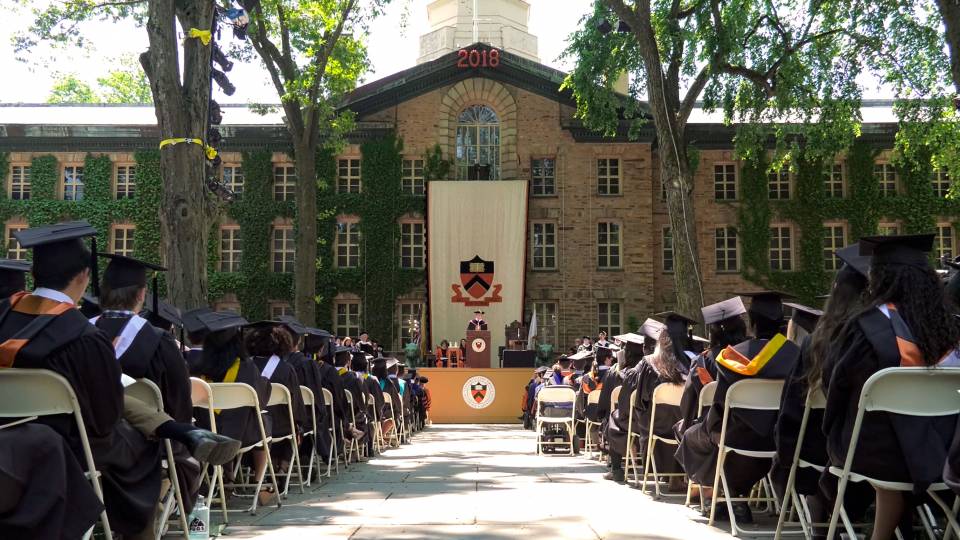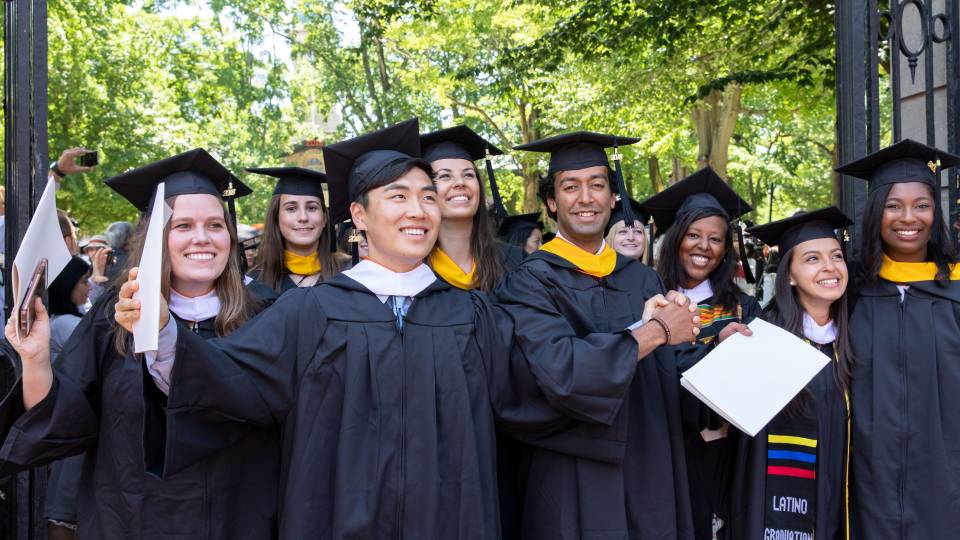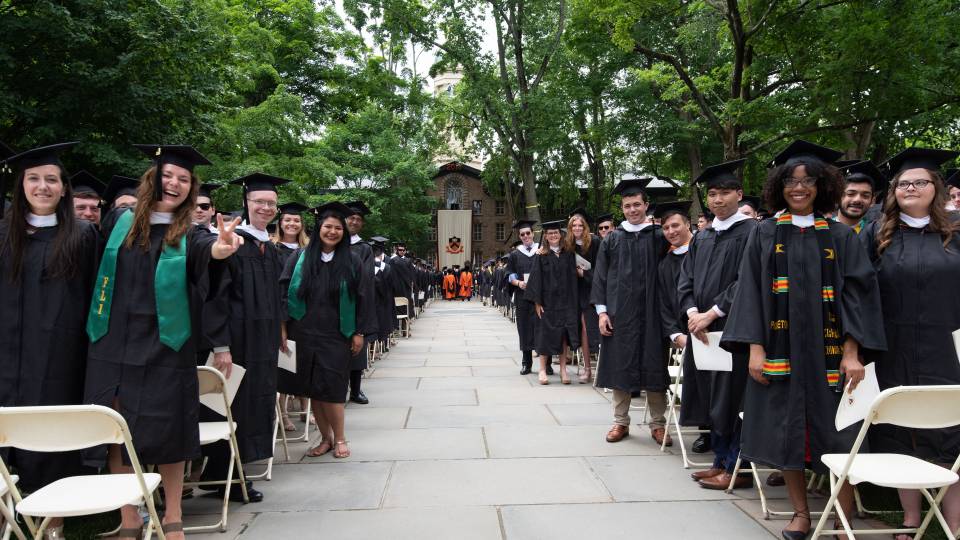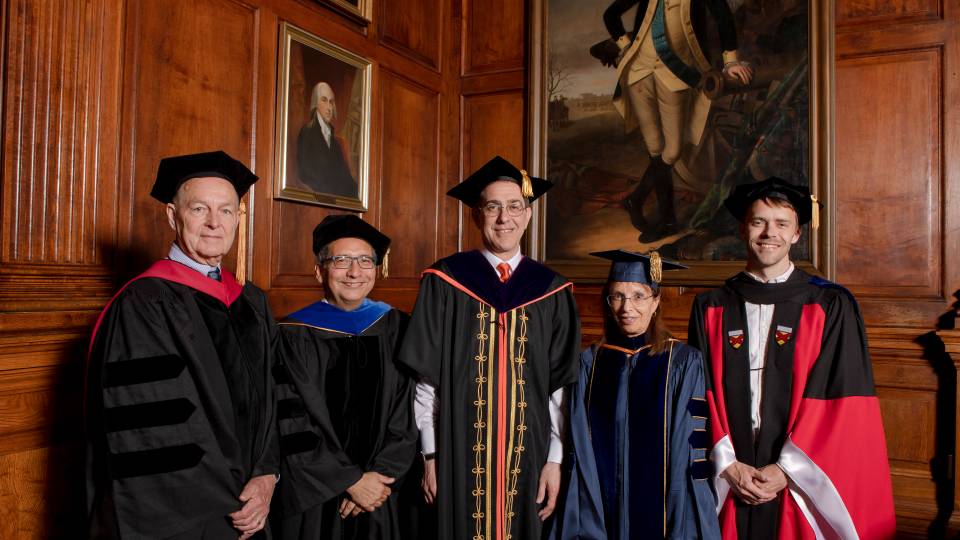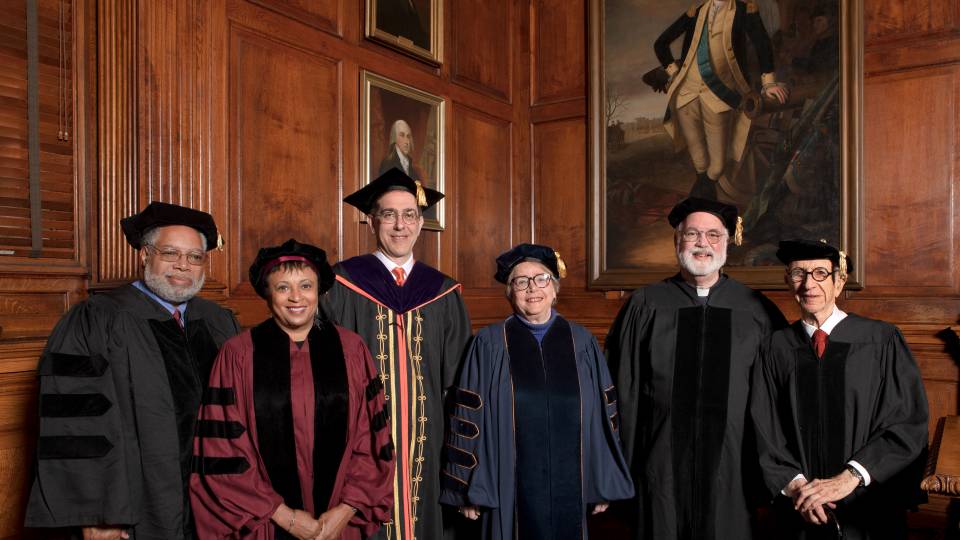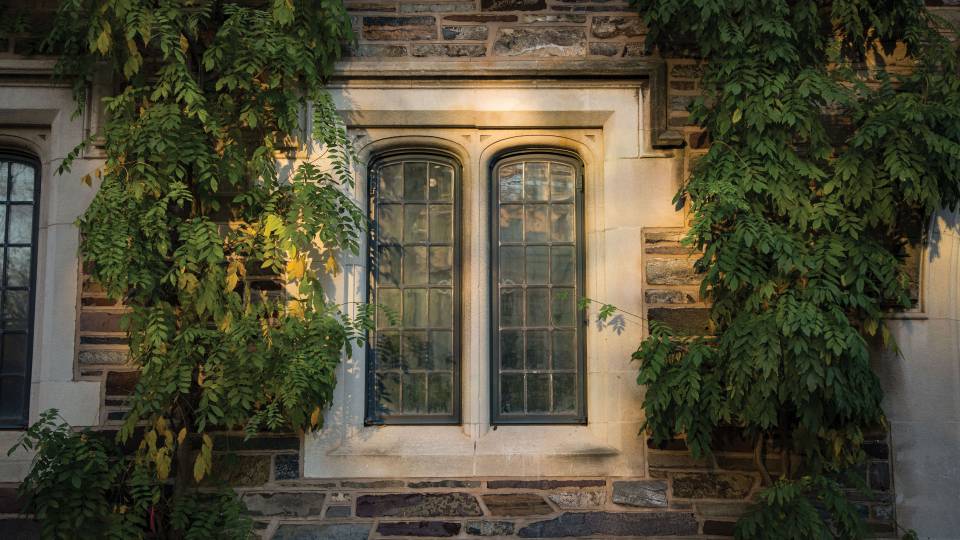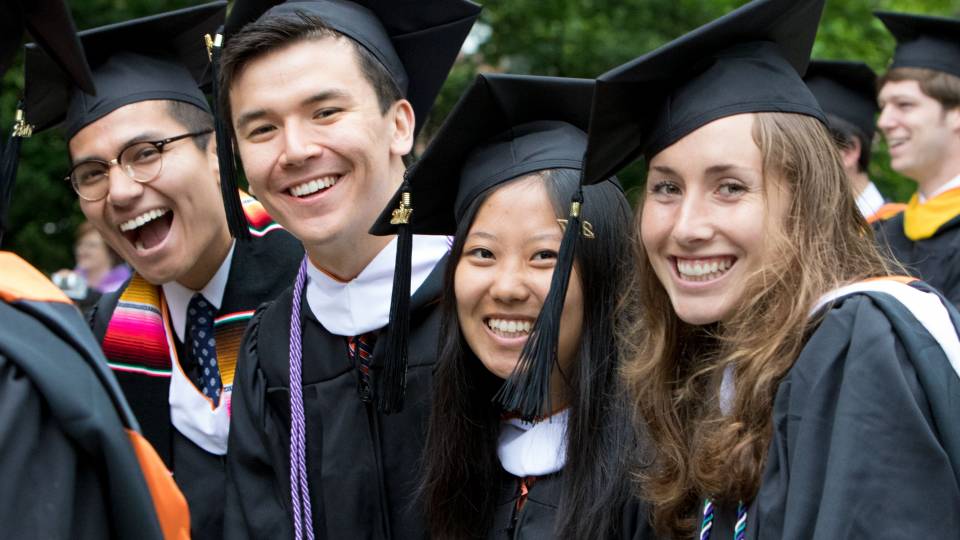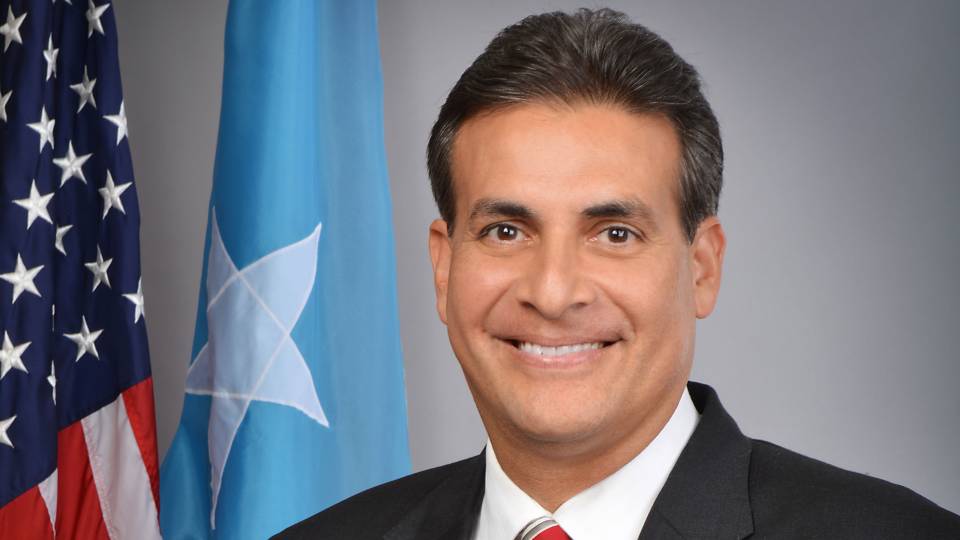At the Hooding Ceremony on Monday, June 4, on Cannon Green, Brahim El Guabli, Ph.D. in comparative literature, receives his hood with a little help from his son, Ilyas Adams El Guabli, and adviser Lital Levy, associate professor of comparative literature.
Blue skies above Cannon Green echoed the joy and optimism of Princeton University’s advanced-degree recipients as they were presented with their hard-earned regalia at Princeton’s 25th Graduate School Hooding Ceremony, on Monday, June 4.

Class of 1943 Professor of Philosophy Sarah-Jane Leslie presides over her first Hooding Ceremony as Graduate School dean. To welcome Leslie to the role, her dissertation adviser, Stuart Professor of Philosophy Gideon Rosen, hooded her because she did not attend her own hooding in 2007.
“This ceremony is a welcome opportunity for us to recognize the dedication, effort and intellect that you have brought to your work here,” said Princeton President Christopher L. Eisgruber. “Your graduate degree is a testament to your talent and commitment, as well as a mark of true excellence in scholarship and research.”
Sarah-Jane Leslie, the Class of 1943 Professor of Philosophy and dean of the Graduate School, began the ceremony by welcoming the graduates and their friends and families, and thanking faculty and staff for their contributions to the day’s events.
“Our purpose today is to recognize the efforts, dedication and accomplishments of our graduates; to congratulate them for completing master’s and doctoral programs; and to celebrate them as they transition into a broad range of careers in which they will make tremendous contributions in the coming years,” Leslie said.
Leslie acknowledged the nearly 110 faculty members in attendance who would be hooding their advisees and mentees. “Their presence and participation remind us that the journey to an advanced degree is made possible only with the continued encouragement, guidance and support of dedicated faculty,” she said.
The colorful gowns and hoods worn as part of traditional academic regalia trace their history to medieval Europe, where heavy woolen robes were necessities in the cold halls of universities. Hoods embody an important symbolism and distinguish the wearer both by rank and academic discipline. Each hood is bordered by a velvet band in the color assigned to the academic discipline in which the degree is granted, and the lining bears the degree-granting university’s own colors — at Princeton, orange with a black chevron.
“Your hood signifies the knowledge that you have gained, the skills you’ve developed, as well as something truly spectacular, which is your mastery of and contributions to your scholarly field,” Leslie told the graduates.
Nearly 140 members of the Ph.D. class of 2018 chose to be hooded by faculty members. Many described their decision as an opportunity to honor their years of mentorship, a time during which a faculty member guides an aspiring scholar on their journey to becoming a future colleague.

Graduates enjoy sunshine and light breezes out on the expanse of Cannon Green as they await their regalia.
Ingrid Ockert, who is receiving her doctorate in history of science, said being hooded by her adviser, Erika Milam, professor of history and director of graduate studies for the Program in History of Science, was a tribute to their six-year apprenticeship.
“Under her watch, I’ve certainly improved as an academic, but I also think that I’ve also really grown as a person,” Ockert said. “She’s modeled to me what it means to be an academic: to be generous and kind in teaching, advising and scholarship.”
The ceremony had a special significance for Milam, as well, as it was her first time hooding. She hooded two students whose advisers were unavailable, in addition to Ockert and another advisee, Emily Kern.
“Emily Kern and Ingrid Ockert started their Ph.D.s at Princeton the same year I arrived on campus as a professor, in the fall of 2012,” Milam said. “Getting to know them and gaining a sense of this place are inextricably intertwined in my memories. … They are the first graduate students I have advised and I am immensely proud of them both.”
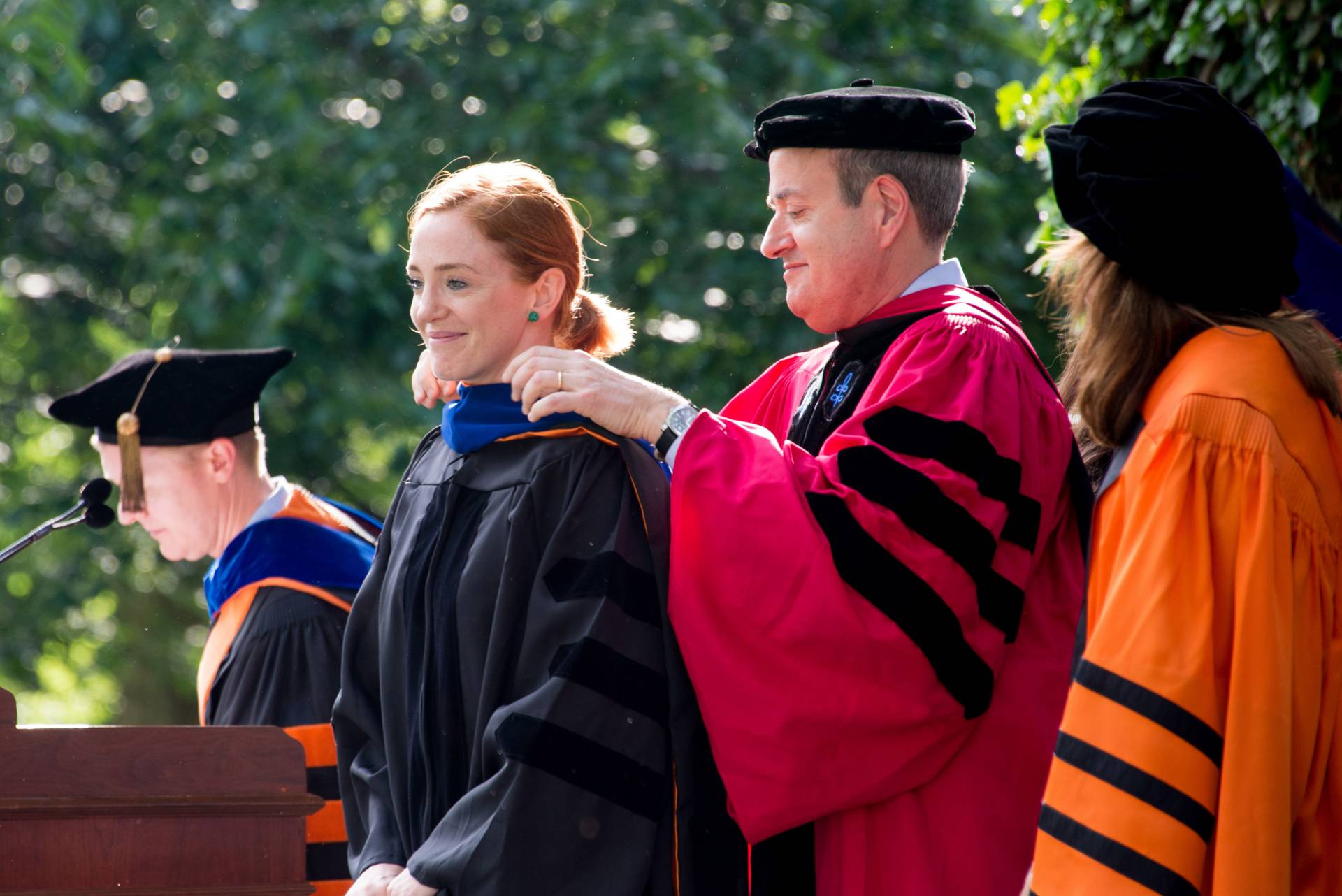
Nearly 140 members of the Ph.D. class of 2018 chose to be hooded by the approximately 110 faculty members in attendance.
For faculty, hooding is a wonderful opportunity to mark and celebrate an advisee’s “once-in-a-lifetime achievement,” said Emily Carter, dean of the School of Engineering and Applied Science, the Gerhard R. Andlinger Professor in Energy and the Environment and professor of mechanical and aerospace engineering and applied and computational mathematics.
“I think of my graduate students as starting more or less unformed but with tremendous promise,” she said. “My role is to guide them along their path to becoming an outstanding independent scholar, to teach them to think critically, deeply, and creatively, to help them acquire the technical skills they need to carry out their research, and to imbue in them the highest standards of excellence in scholarship.”
Martina Lessio, a Ph.D. student in chemistry and one of two students hooded by Carter, said she was grateful for Carter’s example of research, teaching and mentorship.
“Emily Carter sometimes referred to me and other members of the group as her ‘academic children,’” Lessio said. “I definitely felt and still feel like she has been my ‘academic mother’ and I couldn’t ask for a better one. … Hooding means to me that I am now empowered to continue in her footsteps working towards important goals to improve our society, from developing clean energy technologies to increasing diversity in academia and in science, in particular.”

Benjamin and Leonardo Cardenas Chávez proudly share the stage with their mother, Ireri Elizabeth Chávez Bárcenas, a doctoral candidate in music, as she receives her hood from Wendy Heller, the Scheide Professor of Music History.
Casey Lew-Williams, an assistant professor of psychology, who hooded his advisee, Jessie Schwab, as well as two other students, said he sees hooding as a “celebration of the values of higher education,” which includes both successes and failures in the pursuit of knowledge.
“Every graduate walking across the stage worked relentlessly to address a question,” he said. “They, in fact, spent much of their 20s (or maybe 30s or 40s) trying to figure out the best way to think about this question. They may have a shaky answer or a thorough answer, and their question may be purely theoretical or applied, but at this ceremony we get to publicly laud their pursuit of knowledge.”
Akil Word-Daniels, a newly minted Ph.D. in electrical engineering and materials science, said he felt appreciative for the support of family and friends and the many people who stood behind him as he earned his degree. But mostly, he was excited and ready to begin the next chapter. “I feel inspired to hopefully help and hopefully make some good kind of change in the world,” he said.
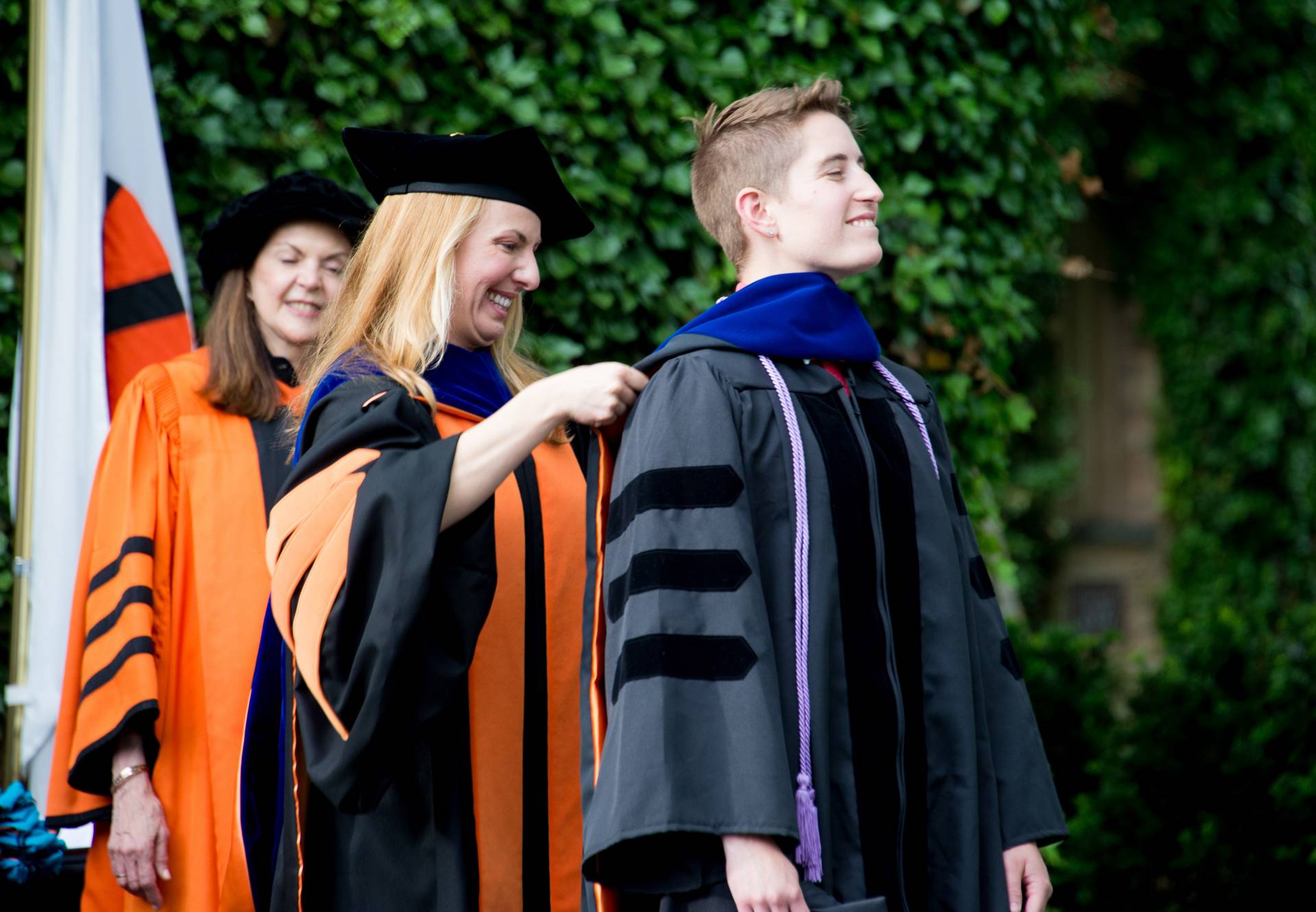
Leslie hoods philosophy Ph.D. candidate Robin Dembroff while Sandra Bermann, the Cotsen Professor in the Humanities, professor of comparative literature and chief marshal for University Convocations looks on.
Advanced-degree recipients were awarded their degrees at Princeton’s 271st Commencement on Tuesday, June 5. The 563 graduate degrees granted during the academic year were:
- 396 Doctor of Philosophy
- 75 Master in Public Affairs
- 27 Master in Finance
- 20 Master of Architecture
- 18 Master of Science in Engineering
- 16 Master in Public Policy
- 9 Master of Engineering
- 2 Master of Arts in Near Eastern Studies
Two attendees who received graduate degrees in prior years also received hoods. Princeton trustee Ann Kirschner, who graduated in 1978 with a Ph.D. in English before the Hooding Ceremony was initiated, was hooded by Leslie in honor of her contributions to the University. Leslie, who became the Graduate School dean in January and did not participate in the ceremony when she earned a Ph.D. in philosophy in 2007, was hooded by her adviser, Stuart Professor of Philosophy Gideon Rosen.
The 2018 recipients of the Graduate Mentoring Awards were honored during the Hooding ceremony. Presented by the McGraw Center for Teaching and Learning, the awards annually recognize faculty members for their exceptional work as mentors to graduate students at Princeton.
This year’s recipients are Bridget Alsdorf, associate professor of art and archaeology; Hendrik Hartog, the Class of 1921 Bicentennial Professor in the History of American Law and Liberty and professor of history; Yael Niv, associate professor of psychology and the Princeton Neuroscience Institute; and Stanislav Shvartsman, professor of chemical and biological engineering and the Lewis-Sigler Institute of Integrative Genomics.
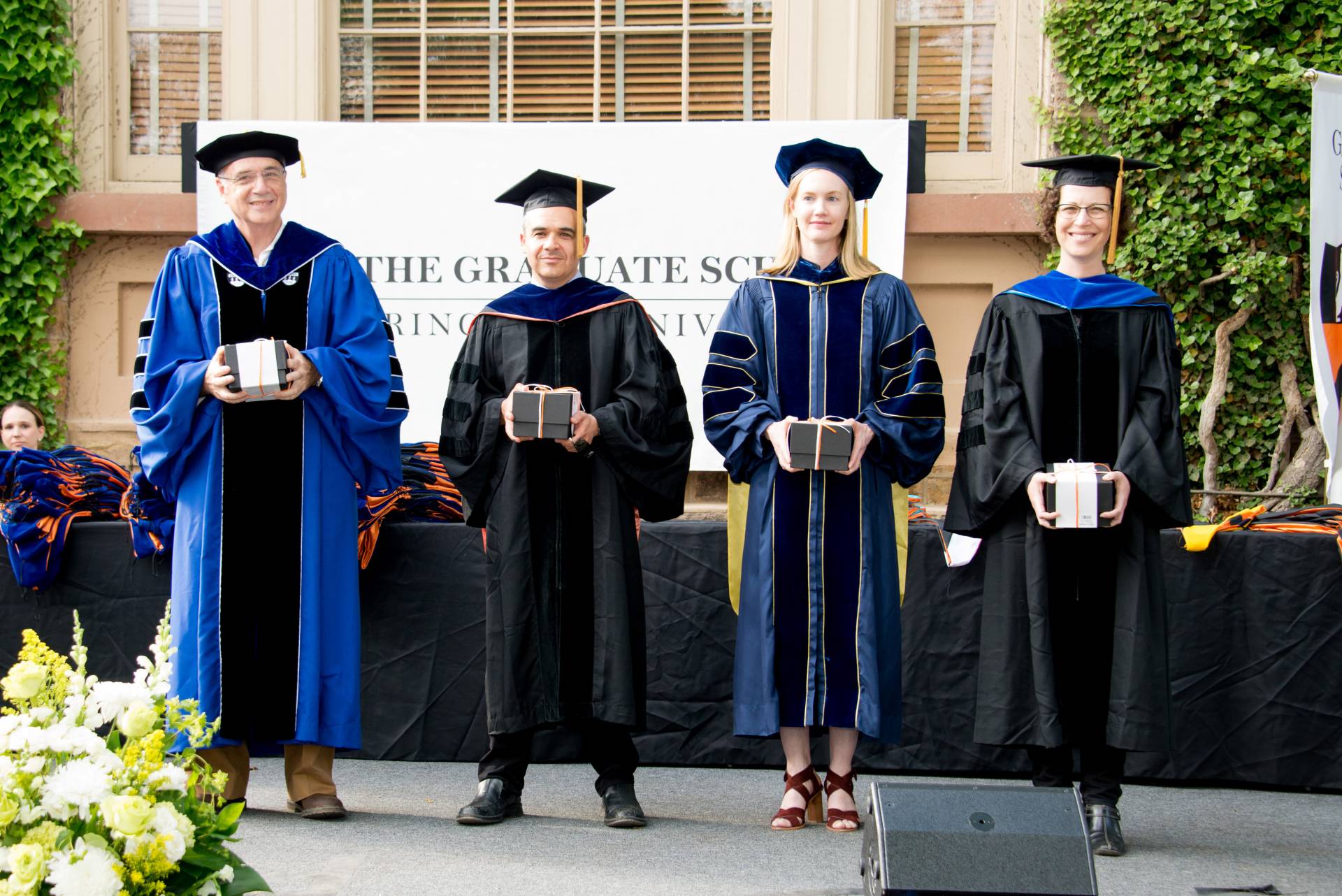
The 2018 recipients of the Graduate Mentoring Awards were honored during Hooding. Presented by the McGraw Center for Teaching and Learning, the awards annually recognize faculty members for their exceptional work as mentors to graduate students at Princeton. This year’s honorees are, from left to right, Hendrik Hartog, Stanislav Shvartsman, Bridget Alsdorf and Yael Niv.
Eisgruber congratulated the students as they join Princeton’s graduate alumni community, and reminded them they now can count themselves among a distinguished group that includes U.S. President James Madison and British mathematician Alan Turing, as well as John Bardeen, the only person ever to have won the Nobel Prize in Physics twice; Elaine Fuchs, who was awarded the 2009 National Medal of Science for her groundbreaking stem cell research, which has led to a better understanding of inherited diseases and cancer; and José A. Quiñonez, who founded Mission Asset Fund, an organization that provides pathways to prosperity for low-income communities, and for which he received a 2016 MacArthur Fellowship for his pathbreaking innovations in financial services.
“These illustrious alumni and many others have pursued careers that exemplify the power of disciplinary knowledge and rigorous graduate training to change the world for the better,” Eisgruber said. “Your membership in this alumni community is at once an accomplishment and a call to action.
“I know that each of you will find your own path of service to the nation and to humanity,” Eisgruber added. “My colleagues and I look forward to seeing that path unfold in the years ahead.”
The Hooding Ceremony will be available for later viewing online. End-of-the-year activities began with the Baccalaureate service on Sunday, June 3, and Class Day on June 4. Graduation activities conclude with Commencement on Tuesday, June 5.

Princeton University’s advanced-degree recipients are all smiles after completing their years-long academic journey leading to the moment of their hooding.

Geoff Purdum, a Ph.D. in chemical engineering, shares honors with his son, Braedon, 8 months. Purdum said he wanted Braedon to graduate with a degree in “Pooh Bear,” but Braedon instead chose to pursue studies in “Blocks.”

Master in Public Affairs student James Oladipupo Williams, center, poses with friends and family after the ceremony; from left, mother Eniola Williams, sister Taiwo Williams, aunt Folabomi Akimbajo, and friend Rochelle Haynes, a 2006 graduate alumna.

